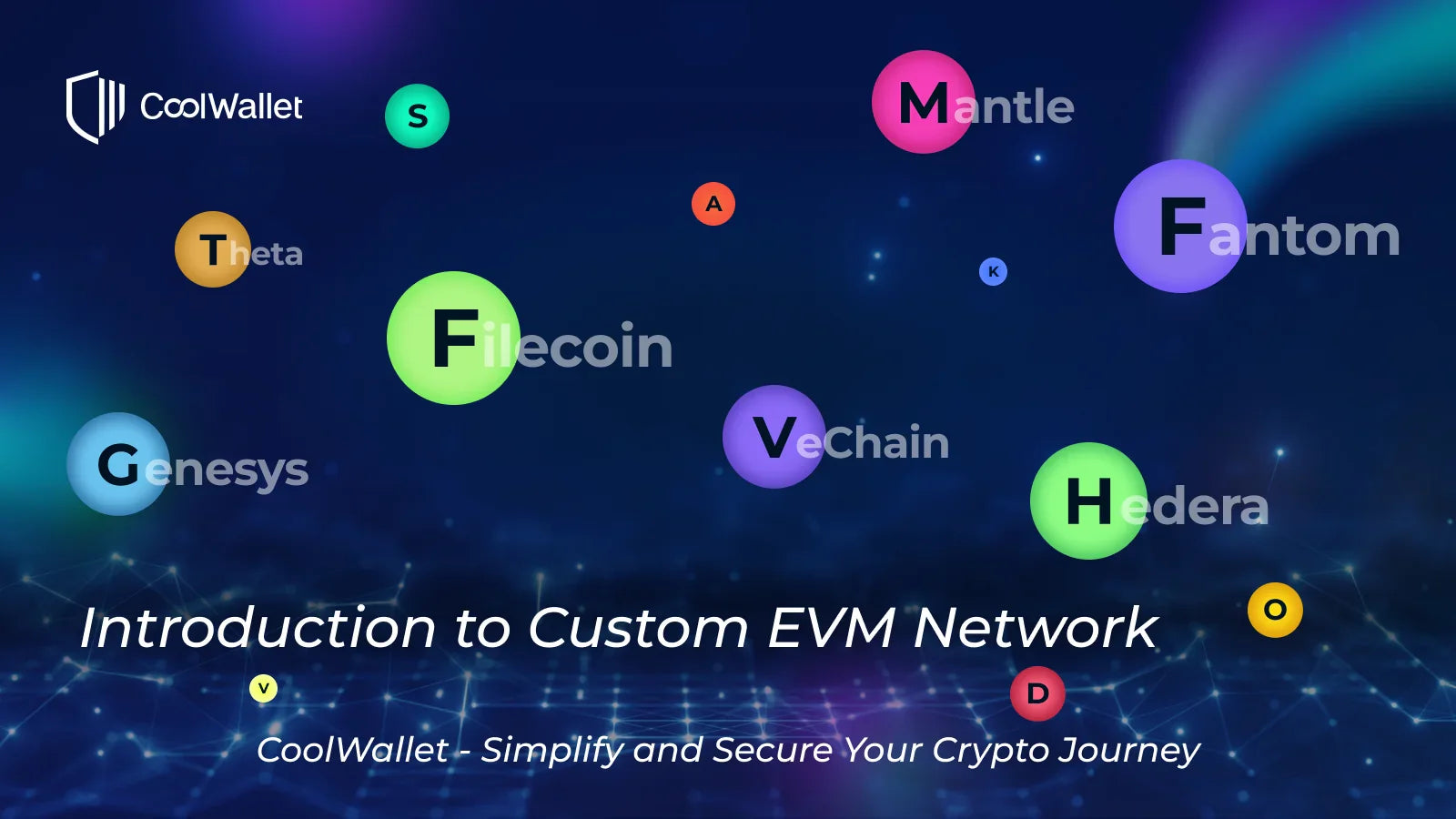
Custom Networks let users add new EVM-compatible blockchain networks to their crypto wallets, expanding access beyond official options. This allows exploration of new projects, DeFi, and personal blockchain setups. However, users must be cautious of security risks and potential issues with unreliable RPC endpoints. Custom networks offer flexibility but need careful management for safety and smooth use.
Content
- What Is Custom Network
- What Is an EVM-Compatible Chain
- What Is the Ethereum Virtual Machine (EVM)
- Why Is Custom Network Important
- Key Components of a Custom Network
- Why Is Custom Network Important While Choosing a Cold Wallet
- Challenges of Custom Networks
- Conclusion
- Custom Network FAQs
What Is Custom Network
Crypto wallets typically support only a limited number of blockchains due to resource constraints. The Custom Network feature allows users to manually add any EVM-compatible chain by entering key information like the network name, chain ID, and RPC URL. This flexibility enables users to interact with a wider range of blockchain networks beyond those officially supported by their wallet.
What Is an EVM-Compatible Chain
In simple terms, EVM compatibility means a blockchain can run the same smart contracts as Ethereum. An EVM-compatible chain is a blockchain that works with the Ethereum Virtual Machine, allowing it to execute Ethereum-based smart contracts without needing any changes. These blockchains are built to function like Ethereum, meaning that decentralized applications (dApps) created for Ethereum can easily be deployed on them.
Click here to learn more about EVM-Compatible Chains.
What Is the Ethereum Virtual Machine (EVM)
The Ethereum Virtual Machine (EVM) mentioned above acts as the engine that powers the Ethereum blockchain. It is a global, decentralized computer that executes smart contracts—self-executing programs that automatically follow pre-set conditions. The EVM ensures these contracts run the same way on all nodes, guaranteeing that results are predictable and consistent across the network.
Why Is Custom Network Important
Back to the topic, adding custom networks to crypto wallets provides several key benefits:
- Access to New Blockchain Ecosystems: Users can easily add new, trending EVM-compatible networks to their wallet, exploring new projects, DeFi platforms, and NFTs. This increases the chances of participating in airdrops or early investment opportunities.
- Support for Unofficial Networks: Users can add networks that their wallet doesn’t officially support yet, granting early access to new and promising blockchains.
- User-Built Networks: Developers and advanced users can add and test their own blockchain networks, enabling them to manage and interact with custom decentralized applications (dApps) securely.
In short, custom networks give users the flexibility to explore new opportunities and experiment with innovative blockchain solutions.
Key Components of a Custom Network
When adding a custom network, several key components are required to ensure smooth functionality:
- Network Name: The identifiable name of the custom network, used for recognition within the wallet.
- Chain ID: A unique identifier that helps differentiate the custom network from other EVM-compatible chains, preventing transaction errors.
- RPC URL: The Remote Procedure Call (RPC) URL enables communication between the wallet and the blockchain, facilitating transaction processing and data retrieval.
- Symbol (Native Token Name): Each custom network has its own native token (like ETH on Ethereum), used for transaction fees and gas.
- Explorer URL: An optional link to a block explorer, where users can track transactions, check balances, and view blockchain activity.
These elements enable users to add and interact with custom networks in their crypto wallets effectively.
Why Is Custom Network Important While Choosing a Cold Wallet
When selecting a cold wallet, like CoolWallet Pro, the ability to add a custom network is crucial for several reasons:
- Flexibility: Custom network support allows users to store assets from a broader range of blockchains, including newer or less mainstream networks, ensuring they are prepared for future developments.
- Security: Cold wallets store private keys offline, providing an extra layer of security for assets on custom networks, protecting them from online threats and hacks.
- Future-Proofing: As blockchain technology evolves, having the option to add custom networks ensures that users can adopt new networks without having to switch wallets.
- Advanced User Needs: For developers and power users, custom network support allows secure access and interaction with personal or niche blockchain networks while benefiting from the high security of offline storage.
In summary, choosing a cold wallet with custom network capabilities ensures users can securely manage their assets across a broader range of blockchain networks while staying flexible and future-ready.
Challenges of Custom Networks
While adding custom networks offers flexibility, there are also some challenges:
- Security Risks: Custom networks can introduce security vulnerabilities, especially if they haven’t been thoroughly vetted. It’s crucial to only connect to trusted networks.
- Malicious Network Providers: Untrusted networks can provide false blockchain data (e.g., incorrect balances or transaction statuses) and may track your online activity. Always verify the legitimacy of a network before adding it to your wallet.
- Unstable RPC Endpoints: Reliable blockchain access depends on the RPC Endpoint. If it’s unstable, users may experience issues viewing balances or making transactions. In such cases, switching or updating the RPC Endpoint in the wallet settings may be necessary.
In summary, managing custom networks requires care and attention to ensure security and smooth operation.
Conclusion
Custom Networks play an important role in the blockchain ecosystem, providing flexibility and opportunities for users to explore new projects and manage their assets across various blockchains. However, it’s essential to approach custom networks with caution, ensuring that you add only trusted and secure networks while regularly maintaining network settings for reliable performance. By doing so, users can take full advantage of custom networks while safeguarding their assets and privacy.
Custom Network FAQs
Q1. What is a custom network?
The custom networks feature allows you to manually add EVM-compatible chains that are not officially supported by CoolWallet, enabling you to interact with the added networks through CoolWallet.
Q2. How is a custom network different from an officially supported chain?
Custom networks do not support crypto swaps or credit card purchases. Additionally, transaction history is limited, showing only records of transactions sent through the CoolWallet App.






Share:
Chiikawa: The Cutest Meme Taking Over Solana
Guide for Adding a Custom Network